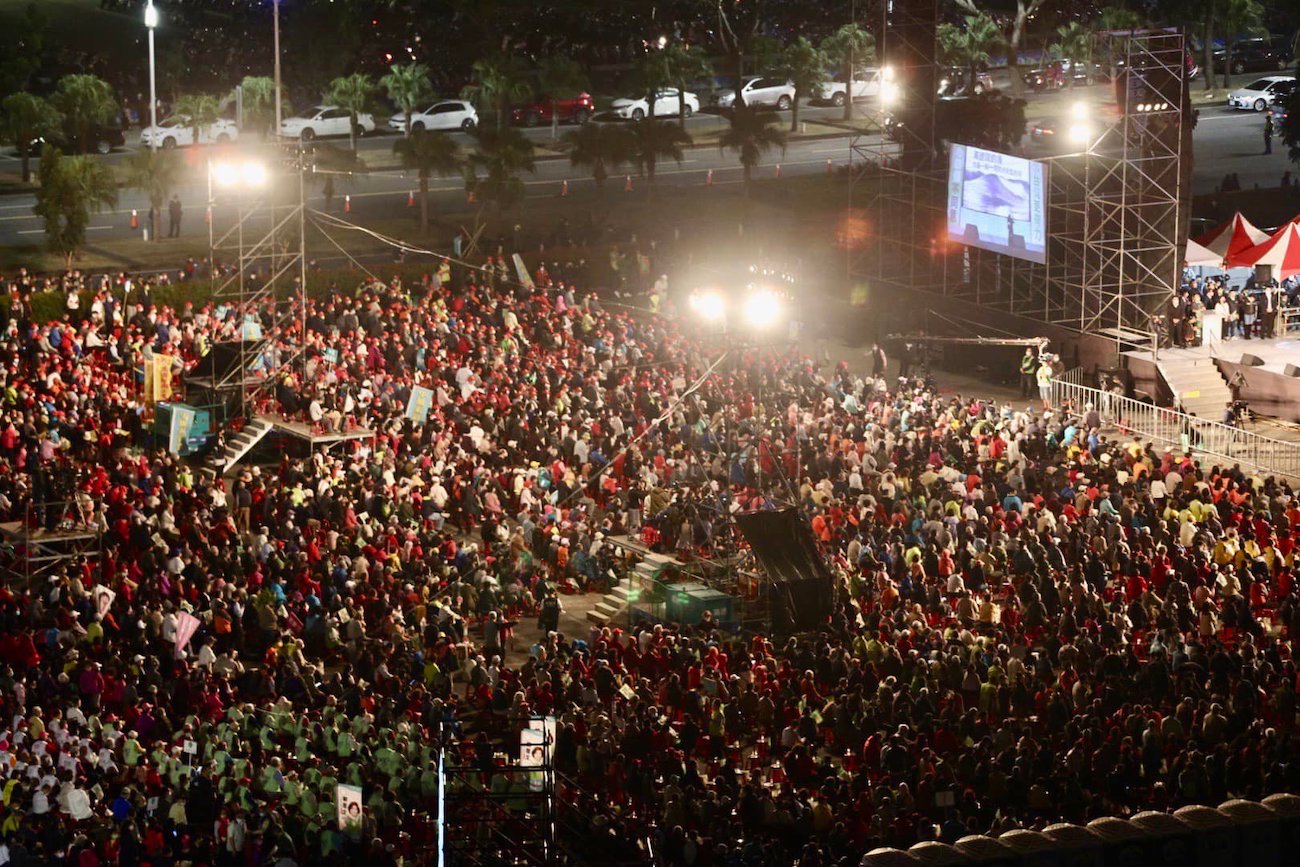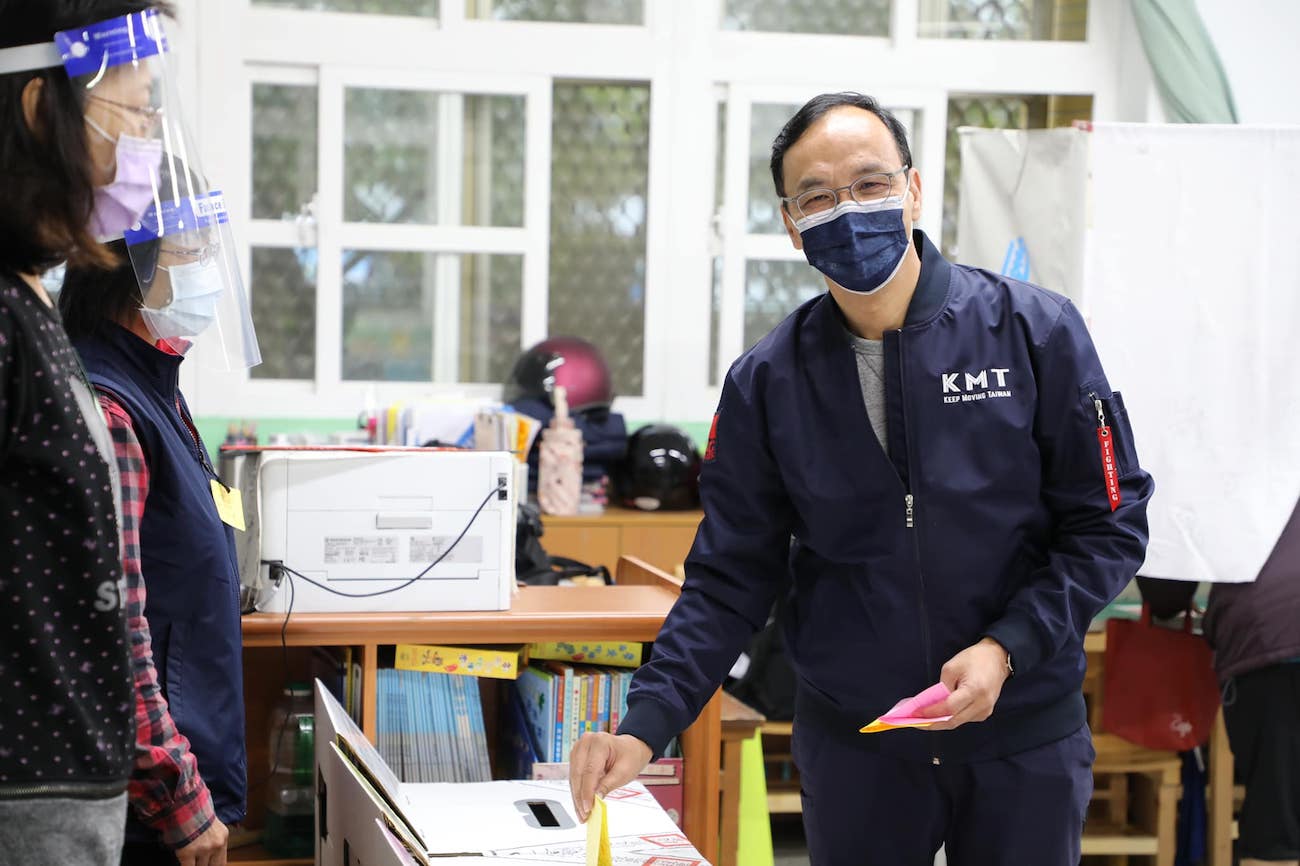by Brian Hioe
語言:
English
Photo Credit: Tsai Ing-wen/Facebook
THE RESULTS OF the national referendum that took place today resulted in a defeat for the KMT and victory for the DPP, with all four referendum proposals voted down. This was what was called for by the DPP, with the DPP advocating four “Nos”.
Four issues were voted on during the referendum. These were the restart of Nuclear Reactor No. 4, the construction of a liquified natural gas terminal off the coast of Datan, Taoyuan, the lifting of barriers to the import of American pork containing the growth hormone ractopamine, and whether the date that national referendums should be held on the same date as elections.
This was the first time that the national referendum was held after changes to the Referendum Act in July 2019 that split the day that referendums are held on from elections. As a result, it was a question ahead of time as to whether the referendum would meet the necessary benchmark to be binding, particularly with rain and cold anticipated for the weekend. 25% of the voter electorate, or around 4.96 million voters, needed to vote for a referendum question for the benchmark for it to be binding to be met. It did not rain, though cold may have affected turnout.
 DPP referendum rally on Ketagalan Boulevard yesterday night. Photo credit: Tsai Ing-wen/Facebook
DPP referendum rally on Ketagalan Boulevard yesterday night. Photo credit: Tsai Ing-wen/Facebook
The vote saw 41.09% turnout. However, the DPP took the clear lead in all four referendum questions. Either way, this did not meet the benchmark needed to be binding. 3,804,755 voted in favor of the restart of Nuclear Reactor No. 4, and 4,262,451 against. 3,936,554 voted in favor of blocking ractopamine pork imports, and 4,131,203 against, 3,951,882 in favor of making referendums take place on the same date elections, and 4,120,038 against, 3,901,171 in favor or relocating the liquified natural gas terminal, and 4,163,464 against.
While campaigning, the KMT framed the referendum as not simply a vote on these four issues, but as a referendum on the Tsai administration as a whole. Likewise, with midterm elections set to take place next year, the referendum would be perceived as a midterm for the midterm, in some sense, in that the referendum would be read as indicating the strength or weakness of support for the DPP going into future elections.
In particular, the KMT was able to successfully leverage on the national referendum in 2018, during which the referendum took place on the same day as nine-in-one local elections. The KMT was likely hoping to replicate this success. One of the referendum questions, on the date that referendums would take place, was because of the fact that while it was the DPP that has historically pushed for lowering benchmarks to hold referendums, but after the KMT’s successful use of the referendum in 2018, it split the date that referendums took place on from referendums.
Yet the results ultimately did not work out in the KMT’s favor. “Agree” votes still surpassed “disagree” votes in areas in which the KMT has historically performed better, including Taipei, Miaoli, Kinmen, and Penghu. New Taipei was an exception, with some attributing this to New Taipei mayor Hou You-yi maintaining distance from the KMT and not campaigning for the KMT regarding referendum issues.
Apart from Hou, Taichung mayor Lu Shiow-yen also did not appear at some KMT campaign events, claiming overwork, with “Disagree” votes surpassing “Agree” votes in Taichung as well. Issues regarding energy transition are particularly sensitive for New Taipei and Taichung, given the location of nuclear power plants in New Taipei and worsening problems of air pollution in Taichung.
Otherwise, the DPP took clear leads in Tainan and Kaohsiung in southern Taiwan, where it has historically had a strong foothold, the 2018 victory of Han Kuo-yu of the KMT notwithstanding. The DPP mobilized its younger politicians in campaigning, including candidates that it intends to field in 2022–a defeat in the referendum would have hurt their chances in future elections. The Tsai administration has a stronger mandate going into future elections following the election results, though the KMT is expected to still leverage on the upcoming recall vote facing pan-Green independent Freddy Lim on January 9th and the by-election for Taichung District 2 after the recall of Chen Po-wei of the pan-Green Taiwan Statebuilding Party, and frame this as also being a referendum on the Tsai administration.
In his concession speech made shortly after 7 PM, KMT chair Eric Chu did not resign to take responsibility for the KMT’s defeat in the referendum. KMT deputy secretary-general Lin Wei-chou has offered his resignation instead.
Chu lashed out at the DPP as “dictatorial,” claiming that because of the current “Birdcage Referendum,” this was why the referendum could not pass. Chu’s rhetoric is in line with claims by former president Ma Ying-jeou that Taiwan has become an “illiberal democracy”, illustrating how the KMT has focused attacks on the DPP by claiming that the DPP is authoritarian. Indeed, Chu thanked Ma in his speech, illustrating Ma’s strong influence within the KMT at present.
 KMT chair Eric Chu casting his vote today. Photo credit: Eric Chu/Facebook
KMT chair Eric Chu casting his vote today. Photo credit: Eric Chu/Facebook
The KMT is likely to continue to try and lash out at the DPP, using the referendum to allege foul play. Ironically, the rhetoric of a “Birdcage Referendum Act” is, in fact, originally taken from the pan-Green camp, and the KMT’s proposals were outvoted anyway.
Some pan-Blue rhetoric at present also asserts that a scandal about infidelity by Taiwanese American musician pop star Wang Leehom overshadowed the referendum, further affecting turnout.
On the other hand, in comments made by President Tsai Ing-wen around 7:30 PM, Tsai stressed unity, framing the referendum as a reflection of Taiwanese democracy, and asserted that different views will be taken into account in policy. Tsai claimed that the results of the referendum showed that Taiwanese hope to build stronger ties with the international world, that they value the environment, and that they support energy transition in Taiwan.
Notably, the issue of US pork imports and the relocation of the liquified natural gas terminal are issues that the DPP and KMT, too, traded positions on between when in power and serving as the opposition. It was originally the KMT that proposed the terminal and lifting barriers on US pork imports, resulting in criticism from the DPP. Nevertheless, the DPP currently claims that the terminal is needed for broader issues regarding energy transition, and it is hoping to angle for trade talks or a free trade agreement with the US by lifting the barrier to US pork imports. Tsai’s framing of the issues at hand, then, is significant.

